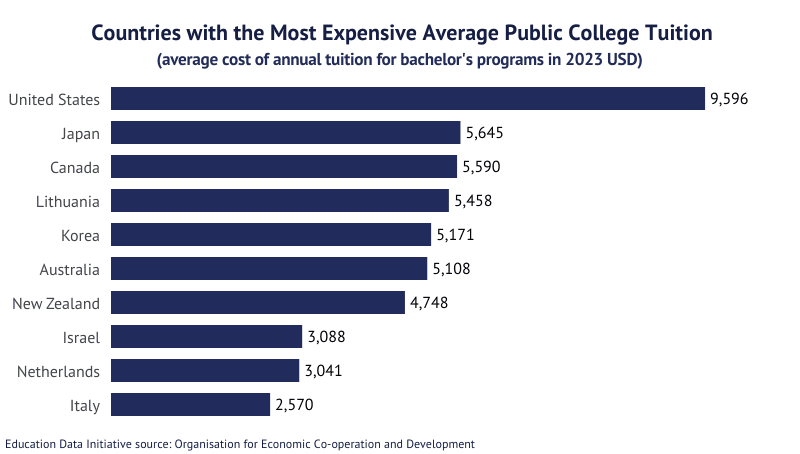“The emphasis on sustainability and technology in Swedish universities is a great advantage for international students.” – Prof. Ingrid Johansson, Stockholm University.
When I first decided to study abroad, Sweden was at the top of my list. The idea of studying in a country known for its innovation, beautiful landscapes, and high quality of life was incredibly exciting. But one question kept popping up in my mind: Is Sweden expensive for international students?
Sweden is known for its high living standards and quality education. But this often comes with a higher price tag. International students may find tuition fees, housing, and daily expenses to be more expensive compared to other countries.
However, Sweden offers many benefits like a safe environment, excellent education, and a vibrant student life. Scholarships and part-time job opportunities can also help manage expenses. Understanding the costs and planning ahead can make studying in Sweden a rewarding experience. Let’s explore the various expenses and ways to budget efficiently.
Now that I’ve lived here for a while, I can confidently share my experience. Spoiler alert: it’s not as scary as you might think! Let me break it down for you in simple terms.

Cost Of Living
Sweden is known for its high quality of life, but many wonder about the cost of living for international students. While the expenses can be high, understanding specific costs helps in planning. Key areas to consider are housing and utilities.
Housing
Housing is often the largest expense for students in Sweden. Options range from student dormitories to private apartments. Dormitory costs vary between 2,500 and 6,500 SEK per month. Private apartments can be more expensive, sometimes exceeding 10,000 SEK monthly. Availability can be limited, so early application is crucial.
Utilities
Utilities include electricity, heating, and water. These are usually separate from rent in private apartments. Monthly utility costs can range from 500 to 1,000 SEK. Many student accommodations include utilities in the rent, which simplifies budgeting. Internet is another utility to consider. It can cost between 200 and 400 SEK per month, depending on the provider.

Tuition Fees
Many international students wonder about tuition fees in Sweden. Are they affordable? This is a common question. Tuition fees vary across universities. They depend on whether the institution is public or private.
Public Universities
Public universities in Sweden are popular among international students. They offer quality education at lower costs. For non-EU students, tuition fees range from $9,000 to $15,000 per year. Fees vary by program and course level. Master’s programs may cost more than bachelor’s programs.
Private Institutions
Private institutions in Sweden usually charge higher fees. Tuition fees at private universities can range from $12,000 to $25,000 per year. Private institutions may offer specialized courses. These might have higher tuition costs. Scholarships can help reduce costs. Many private schools offer financial aid to international students.
Daily Expenses
Living in Sweden as an international student can be a rewarding experience. However, understanding daily expenses is crucial for budgeting. Let’s break down the costs of food and groceries, and transportation.
Food And Groceries
Food and groceries form a significant part of daily expenses. In Sweden, grocery shopping is not cheap. Basic items like bread, milk, and eggs are pricier than in many other countries. A loaf of bread may cost around 25 SEK. Milk can cost about 10 SEK per liter.
Buying in bulk can save money. Many students prefer cooking at home. It’s cheaper than eating out. Dining at restaurants can be costly. A meal at a mid-range restaurant might cost around 100 SEK. Fast food is a cheaper option, costing around 70 SEK for a meal.
Transportation
Transportation costs can add up quickly. Public transport is reliable but not cheap. A monthly pass for buses and trains can cost around 800 SEK. Biking is a popular and cost-effective option. Many students buy second-hand bikes to save money.
Sweden has a well-connected public transport system. Students can use buses, trams, and trains to get around. Look for student discounts on transport passes. It’s a good way to save money.

Healthcare
Healthcare is a significant concern for international students in Sweden. Understanding the healthcare system, insurance requirements, and available medical services is essential. This information ensures students can access medical care without unexpected costs.
Insurance Requirements
International students must have health insurance in Sweden. EU/EEA students can use their European Health Insurance Card (EHIC). Non-EU/EEA students need private insurance. Some universities offer insurance plans for students. Ensure your plan covers medical treatments, hospital stays, and emergency care.
Medical Services
Sweden has excellent medical services. Students can access public and private healthcare. Public healthcare is subsidized, making it more affordable. Private healthcare is more expensive but offers shorter wait times.
Students can visit health centers for minor issues. For severe conditions, hospitals provide specialized care. Many universities have student health centers. These centers offer basic medical services, mental health support, and sexual health services.
|
Service |
Public Healthcare |
Private Healthcare |
|---|---|---|
|
Cost |
Subsidized |
More expensive |
|
Wait Times |
Longer |
Shorter |
|
Specialized Care |
Available |
Available |
Pharmacies are widely available in Sweden. Prescription and over-the-counter medicines are easy to find. Always carry your insurance card and ID when visiting a pharmacy.
Emergency services are available 24/7. In an emergency, dial 112 for immediate assistance. Swedish healthcare professionals are trained and provide high-quality care.
Understanding healthcare in Sweden helps international students stay healthy. It also ensures they can handle medical issues efficiently. Prepare in advance and stay informed about healthcare options.
Financial Aid
Sweden has a reputation for being expensive. This is especially true for international students. Yet, financial aid can make a big difference. Understanding available financial aid options is crucial. They can help offset costs and ease financial stress.
Scholarships
Many universities in Sweden offer scholarships. These scholarships can cover tuition fees. Some also provide living expenses. Scholarships are awarded based on merit. They are competitive but worth applying for. Research different scholarships thoroughly. This can increase your chances of securing one.
I was lucky to get some financial help through scholarships. Here are some options you can explore:
Swedish Institute Scholarships (for master’s students from select countries)
University-specific Scholarships
SI Study Scholarships for Global Professionals
If you start searching early, you can find funding opportunities to reduce your costs.
Grants And Loans
Grants and loans are other options for financial aid. Grants do not need to be repaid. They are often need-based. Loans, on the other hand, must be repaid. They usually have low-interest rates. Some loans are specifically for international students. Explore these options early. This can help you plan your finances better.
“Sweden provides a balanced mix of academic excellence and student-friendly policies, making it a top choice for global scholars.” – Dr. Johan Eriksson, Uppsala University.
Part-time Work
Sweden can be expensive for international students. Part-time work helps cover living costs while gaining valuable experience.
Many international students in Sweden seek part-time work. It helps cover living costs. It also provides valuable experience. But is it easy to find part-time jobs? What are the rules? Let’s explore.
Employment Opportunities
Sweden offers many job opportunities for students. Many businesses need extra help. Cafes, restaurants, and shops often hire students. Universities also provide part-time positions. These can be in libraries or research projects. Knowing Swedish can increase your chances. But there are jobs for English speakers too.
Work Regulations
Sweden has clear work regulations for students. There is no official limit on working hours. But balancing work and study is crucial. Overworking can affect your grades. Make sure to check your visa requirements. Some visas have specific rules. Always keep your studies a priority. Employers in Sweden respect student schedules. They often offer flexible hours. This helps students manage their time better. “`
Cost-saving Tips
Studying in Sweden offers a unique experience but can be costly. To help international students manage their expenses, here are some practical cost-saving tips. These tips will help you make the most of your budget while enjoying your time in Sweden.
Student Discounts
Many places in Sweden offer discounts for students. Show your student ID at museums, cinemas, and public transport. It can save you a lot of money. Restaurants and cafes sometimes have special student offers too. Always ask if there is a discount available.
Budgeting Strategies
Create a monthly budget to track your expenses. List all your fixed costs like rent and utilities. Then, allocate money for food, transport, and leisure. Stick to your budget to avoid overspending. Use apps to help manage your finances. They can notify you when you are close to your limit.
Cook at home instead of eating out. Groceries are cheaper than restaurant meals. Plan your meals and shop once a week. Buy in bulk when possible. It reduces the cost per unit. Compare prices in different stores to find the best deals.
Share accommodation with other students. Rent is one of the biggest expenses. Sharing can cut this cost significantly. Look for roommates on student forums or social media groups.
Comparing With Other Countries
Sweden is known for its high-quality education system. But how does it compare to other countries in terms of cost for international students? Let’s break it down by looking at both European nations and a global perspective.
European Nations
When comparing Sweden with other European countries, the costs can be quite different. For instance, tuition fees in the United Kingdom are often higher. Many universities in the UK charge between £10,000 and £38,000 per year. Living expenses in the UK can add another £9,000 to £12,000 annually.
Germany, on the other hand, offers free tuition at public universities. But students still need to cover living expenses, which can be around €10,000 per year. In France, tuition fees are low, usually around €2,770 per year for bachelor’s programs. Living costs in France can range from €10,000 to €12,000 annually.
Sweden’s tuition fees for international students range from SEK 80,000 to SEK 140,000 per year. Living costs can be around SEK 8,000 per month. This makes Sweden more expensive than Germany and France but comparable to the UK.
Global Perspectives
Looking at a global scale, the United States is one of the most expensive countries for international students. Tuition fees in the US can range from $20,000 to $50,000 per year. Living expenses can add another $10,000 to $15,000 annually. Australia is also costly, with tuition fees ranging from AUD 20,000 to AUD 45,000 per year. Living costs can be around AUD 21,000 per year.
In Canada, tuition fees range from CAD 20,000 to CAD 30,000 per year. Living expenses can add another CAD 15,000 per year. Compared to these countries, Sweden is moderately priced. Tuition and living costs in Sweden can be lower than in the US and Australia but higher than in Germany and France.
Frequently Asked Questions
Is Living In Sweden Costly For Students?
Living in Sweden can be expensive for international students. Rent and daily expenses are higher compared to many other countries. However, students can find budget-friendly options and discounts.
How Much Is Student Accommodation In Sweden?
Student accommodation in Sweden typically ranges from SEK 2,500 to SEK 6,500 per month. Costs vary based on location and type of housing. Shared accommodations are usually more affordable.
Are Groceries Expensive In Sweden?
Groceries in Sweden are moderately priced but can be expensive for some items. Shopping at discount stores and buying local products can help save money.
Can Students Work Part-time In Sweden?
Yes, international students in Sweden can work part-time. They can work up to 20 hours per week during the semester and full-time during holidays.
Conclusion
Studying in Sweden can be expensive but manageable with proper planning. Scholarships and part-time jobs help ease the burden. Budgeting wisely is key. Public transportation and student discounts save money. Explore housing options early. Every experience is valuable, even on a budget.
Sweden offers quality education and unique cultural experiences. Balancing expenses and benefits makes the journey worthwhile. Evaluate your financial situation carefully. Make informed choices and enjoy your study abroad adventure in Sweden!
By sharing my story, I hope I’ve given you a clearer picture of what to expect. If you have any questions, feel free to reach out—I’d love to help!






